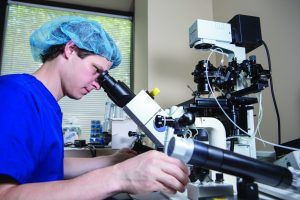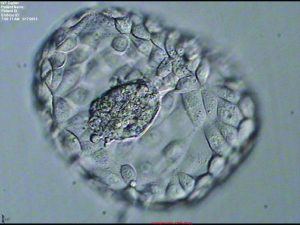Reproductive Medicine Associates of New Jersey
Fertility treatment is often a life-changing and emotional experience, and the dedicated professionals at Reproductive Medicine Associates of New Jersey (RMANJ) are committed to helping patients every step of the way.
RMANJ blends scientific expertise with patient-centered care so patients have a positive experience, explains Daniel Kaser, MD.


Jason Franasiak, MD, lead physician at the practice’s Marlton office
“You’re medicalizing something that otherwise is not, and that can put stress on the relationship, but we work to ensure that we’re treating the whole patient and not just one aspect,” says Kaser, a board-certified obstetrician and gynecologist at RMANJ. “We want our patients to have an experience that is personal, professional and provides them with the best chances to start or continue building their families.”
This approach is backed by nearly 20 years of experience and RMANJ’s ongoing dedication to providing the most comprehensive infertility program in the world. The practice’s clinical, research, financial and support teams are dedicated to offering a full spectrum of infertility care to meet patient needs, seven days a week.
The patient-centered approach begins well before a couple even sets foot into one of RMANJ’s welcoming offices.
“If a couple has been trying for six to 12 months to get pregnant with no success, it’s time to call a specialist,” says Kaser. “Whether you’ve recently been diagnosed with infertility or are looking for more choices for fertility treatment, we encourage patients to get online and compare clinics in terms of their pregnancy rates and also singleton pregnancy rates.”
Patients will discover that RMANJ provides the latest advancement and widest scope of effective infertility treatment options in New Jersey. They’ll also see that the entire staff will personalize patient care based on individual needs.
Kaser says that while science and medicine continue to advance, stories in the media perpetuate myths and misconceptions about exactly what fertility treatments can and can’t do.
“One of the biggest infertility myths is that IVF comes with an increased risk of twins,” says Kaser. “This is no longer true. Multiples often create unintended long-term health and financial burdens, which can now be avoided.”
The experts at RMANJ use a combination of genetic screening and single-embryo transfers to support the promise of one healthy baby at a time.


RMANJ led the development of this one-of-a-kind, well-validated, 24-chromosome screening process, called SelectCCS, which safely identifies whether embryos have a normal or abnormal number of chromosomes.
Since doctors know that genetic errors can occur with all 23 pairs of chromosomes, RMANJ’s screening process comprehensively counts all chromosomes at the molecular level and is more accurate
than previous testing processes that only count a handful of chromosomes.
SelectCCS thus allows the RMANJ team to select a single embryo to transfer back to the mother, reducing the chance of failed pregnancies and multiple babies. RMANJ hasn’t transferred more than two embryos during treatment since 2010.
This process is also beneficial for fertile patients who are facing genetic diseases that could be inadvertently passed down to their children, explains Jason Franasiak, MD, lead physician at the practice’s Marlton office.
“IVF is not just for infertility – it also enables hopeful parents with genetic disease to have healthy babies by conducting thorough genetic screening of embryos before implantation. Families who once feared passing on genetic diseases now have an option of having a healthy family.”
“Knowledge is power for patients,” adds Franasiak. “Implementing things such as SelectCSS or paying attention to the way embryos grow in our lab and explaining those things to the patient gives them control over the situation in a way they didn’t think they had.”
The method has helped raise the clinic’s live birth rate to between 10 and 20 percent more than the national average, though those numbers don’t tell the entire story, explains Kaser.
“On average, delivery rates across fertility practices in the country are about 40 percent. However, fertility programs like RMANJ have consistently reported delivery rates around 60 percent,” he says. “We measure success not necessarily in just getting pregnant, but also in delivering a healthy baby at term.”
RMANJ also measures success by reviewing the amount of time patients spend in treatment.
“The idea that fertility treatment is always a long, arduous process is another myth,” says Franasiak. “At RMANJ, the average time in treatment is a few months, not years.”
This timely approach is especially important since each month, even a healthy, fertile, 30-year-old woman has only about a 20 percent chance of getting pregnant, says Franasiak.
“There are a number of good reasons to push back starting a family, like your career or traveling, but planning ahead is important if having a baby is a priority,” he says. “Even with our best technology, pregnancy rates decline as a woman ages, so we encourage patients to initiate care sooner rather than later.”
RMANJ’s key to keeping treatment timely for patients of all ages and needs, says Franasiak, is communication and resources. The office opens at 6 am every day, and RMANJ doctors – not technicians – conduct cycle monitoring seven days a week, providing a higher level of personalized care and a chance to have those everyday questions answered every day.
“We try to be there for patients in the cracks of life,” Franasiak says. “This is not something people learn a lot about, so you can’t expect these couples to not have that personalized care.”
That personalized care emphasizes the mother’s health before and during treatments, since a healthy mother means an increased likelihood of a healthy baby.
“Pregnancy is a unique time for all women,” Kaser says. “So for patients with medical conditions, we’re able to work with their primary care physicians and specialists to make sure they’re entering into pregnancy at their healthiest.”
Stress can also negatively impact pregnancy, and many couples experience financial stress and worry during fertility treatment. To give hopeful parents peace of mind, RMANJ recently launched CareShare, a 100-percent IVF refund program.
Through CareShare, couples can attempt six cycles of IVF for a single-package price. If after all attempts, there is no live birth and no birth certificate issued, patients receive 100 percent of the program fee back.
“Infertility and all of the stress that comes with it can weigh down on a couple,” Kaser says. “If we can share some of the financial risk, we feel it’s a great service to the patients.”
Reproductive Medicine Associates of New Jersey
Elmwood Business 767 Route 70 East, Building B101
Marlton
856-267-8100
rmanj.com
